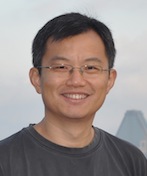
|
 Yu (Brandon) Xia
Yu (Brandon) Xia
Department of Bioengineering
McGill University
3480 University Street
Montreal, Quebec H3A 0E9, Canada
Email: brandon.xia@mcgill.ca
Office: McConnell Engineering Building, Room 360
Phone: 514-398-5026
I am a Professor in the Department of Bioengineering at McGill University, where I hold the Canada Research Chair in Computational and Systems Biology. At McGill, I am also affiliated with the Graduate Program in Biological and Biomedical Engineering, the Graduate Program in Quantitative Life Sciences, and the Centre de Recherche en Biologie Structurale. External to McGill, I am affiliated with the Center for Cancer Systems Biology at Dana-Farber Cancer Institute.
I graduated from Peking University in 1995 with B.S. in Chemistry (major) and Computer Science (minor). I received my Ph.D. in Chemistry from Stanford University in 2003, specializing in computational biology with Michael Levitt. After postdoctoral research with Mark Gerstein at Yale University, I became an Assistant Professor of Bioinformatics and Chemistry at Boston University, with a secondary appointment in Biomedical Engineering. I joined McGill University in 2013 as Associate Professor and was promoted to Professor in 2018. My research interests include: computational biology, structural bioinformatics, biological networks, and evolution.
Honors and awards include: Gold Medal, International Chemistry Olympiad (1990), Howard Hughes Medical Institute Predoctoral Fellowship (1996), Jane Coffin Childs Fellowship (2004), PhRMA Foundation Research Starter Grant in Informatics (2008), K. C. Wong Research Award (2010), Tier 1 Canada Research Chair (2015, 2022), NSERC Discovery Accelerator Supplement Award (2019).
Explore my Google Scholar profile, NCBI profile, ORCID profile, and academic genealogy.
SELECTED PAPERS- Virus targeting as a dominant driver of interfacial evolution in the structurally resolved human-virus protein-protein interaction network. Cell Syst. 16: 101202 (2025).
- Structure-guided evolutionary analysis of interactome network rewiring at single residue resolution in yeasts. J. Mol. Biol. 436: 168641 (2024).
- Are transient protein-protein interactions more dispensable? PLOS Comput. Biol. 18: e1010013 (2022).
- Quantifying evolutionary importance of protein sites: a tale of two measures. PLOS Genet. 17: e1009476 (2021).
- Estimating dispensable content in the human interactome. Nat. Commun. 10: 3205 (2019).
- Nature of long-range evolutionary constraint in enzymes: insights from comparison to pseudoenzymes with similar structures. Mol. Biol. Evol. 35: 2597-2606 (2018).
- Interactome evolution: insights from genome-wide analyses of protein-protein interactions. Curr. Opin. Struct. Biol. 50: 42-48 (2018).
- Domain-based prediction of the human isoform interactome provides insights into the functional impact of alternative splicing. PLOS Comput. Biol. 13: e1005717 (2017).
- The impact of native state switching on protein sequence evolution. Mol. Biol. Evol. 34: 1378-1390 (2017).
- Widespread expansion of protein interaction capabilities by alternative splicing. Cell 164: 805-817 (2016).
- Widespread macromolecular interaction perturbations in human genetic disorders. Cell 161: 647-660 (2015).
- Signatures of pleiotropy, economy and convergent evolution in a domain-resolved map of human-virus protein-protein interaction networks. PLOS Pathog. 9: e1003778 (2013).
- Structural principles within the human-virus protein-protein interaction network. Proc. Natl. Acad. Sci. USA 108: 10538-10543 (2011).
- Predicting eukaryotic transcriptional cooperativity by Bayesian network integration of genome-wide data. Nucleic Acids Res. 37: 5943-5958 (2009).
- Structural determinants of protein evolution are context-sensitive at the residue level. Mol. Biol. Evol. 26: 2387-2395 (2009).
- Relating three-dimensional structures to protein networks provides evolutionary insights. Science 314: 1938-1941 (2006).
- Roles of mutation and recombination in the evolution of protein thermodynamics. Proc. Natl. Acad. Sci. USA 99: 10382-10387 (2002).
- Ab initio construction of protein tertiary structures using a hierarchical approach. J. Mol. Biol. 300: 171-185 (2000).
Yu (Brandon) Xia Lab | Department of Bioengineering | McGill University